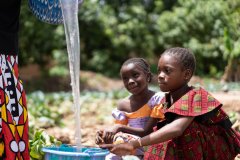
Research of the Public Administration and Policy Group
The globe is facing multiple interconnected sustainability challenges, ranging from sea level rise, water shortages, excessive pollution, and the declining resilience of food production systems. Impacts affect different parts of the world, and different segments of societies, in divergent ways, resulting in normative questions about fairness and justice.
Societies and ecosystems are facing multiple interconnected sustainability challenges, including sea level rise, water shortages, biodiversity loss, and the declining resilience of food systems. Impacts are distributed unevenly across the world, and affect different segments of societies in divergent ways, raising questions about fairness and justice. These challenges can be understood as “wicked problems”, as they involve complex social-ecological systems that behave unpredictably and in uncertain ways, while much disagreement exists about how they should be addressed, when and by whom. Moreover, addressing these sustainability challenges requires transformative change across multiple jurisdictions at an unprecedented pace, while powerful societal actors and vested interests constrain opportunities for systemic governance interventions.
Our work is premised on the understanding that the role of public governance in sustainability transformations is key. We argue that many sustainability crises can be described as “governance crises” – suggesting that the current depth, scope and pace of attempts to address them are falling short. Although sustainability transformations are taking place in different sectors of society, they are often not sufficiently supported by public authorities: instruments and tools to trigger or invoke transformations are not used, unsustainable incentives are maintained, and institutional and political obstacles within government continue to exist. To better understand and address this situation, we developed the research program “Changing Governance and Governing Change”. We study whether, when and how innovative governance strategies and arrangements can be introduced that help realize the necessary sustainability transformations. We aim to understand these transformations across different geographical, temporal and jurisdictional contexts, as such problematizing public governance questions and challenges from different perspectives. By leveraging our disciplinary and interdisciplinary expertise, we aim to make inspiring and innovative contributions to both science and practice in the fields of water, climate, environmental, food and agricultural governance.
Domains and collaborations across disciplines
We mainly work in the fields of water, climate, environment, food and agriculture, as well as the connections between these. In our work, we draw on public administration and public policy concepts and theories, as well as broader social science theorization. We apply a diverse range of methods guided by our research questions and are open to diverse perspectives and approaches. Some of the methods we use are qualitative comparative analysis (QCA), serious gaming, transdisciplinary research in living labs, and more recently artificial intelligence and big data as a means to get insights into policy development and implementation at previously impossible scales.
The PAP group actively collaborates with neighboring groups in the Wageningen Centre for Sustainability Governance (WCSG), which employs more than 100 researchers and is at the forefront of global discussions on sustainability transformations. The WCSG was recently assessed and was found to do "excellent, impact-driven and ample research", and to be "in an eminent position to meet the demand for innovation in governance related to sustainability issues". Additionally, we actively participate in pioneering interdisciplinary research endeavors spanning the breadth of the life sciences, fostering dynamic collaborations with experts in animal science, plant science, environmental science, as well as land and water management.
Click here for the Research Programme of the Public Administration and Policy Group.
Our research lines
The research program comprises three distinct research lines, each exploring a facet of public governance in sustainability transformations: i) Dynamics and directions of change in governance; ii) Between fragmentation and connectivity; iii) Conflict and contestation. These lines not only converse with each other but also draw upon foundational concepts from the field of Public Administration and Policy, extending beyond its traditional boundaries.
-

Dynamics and directions of change in governance
This research line conceptualizes and analyses continuity and change in policies, polity, and politics, and in turn how these enable and constrain the dynamics and directions of societal change in different contexts. Because of the wicked nature of the challenges facing governance actors in the fields of climate, water, environment, food and agriculture, it is very important that policy systems respond to new insights, and do not become locked-in into old problem definitions and understandings. Policy and institutional change towards transformation is of paramount importance, but is hard to create because policies and institutions are often deeply entrenched, surrounded by constituencies that benefit from them, and because of existing power constellations.
-

Between fragmentation and connectivity
Governance systems are typically organized along specialized units, according to distinct competences, and specific time frames. However, sustainability transformations require cutting across these boundaries between temporal, spatial and jurisdictional scales, between public and private spheres, and between science, policy and society. Sustainability challenges need to be addressed by polycentric governance arrangements, which are characterized by complex interactions across scales and actor configurations. Whether or not and why arrangements operate as a connected system, or disaggregate into a fragmented constellation is not clear. This research line develops an understanding of (1) how actors construct and operate across boundaries and to what effect and (2) which institutions (including norms, rules and beliefs) foster interconnectivity across these boundaries (e.g. through boundary objects, collaborative networks and participatory governance, or procedural instruments), or pose constraints.
-

Conflict and contestations
This research line focuses on the role of values and contestation in the design, process and outcome of the governance of sustainability transformations. It analyses what is seen as “good” governance of transformations in terms of effectiveness, legitimacy, accountability, sovereignty, or justice - both in a normative sense and empirically across various contexts and stakeholders. Recently, this research line has also come to include analyses of the ‘dark side’ of sustainability transformations, as potential negative or unintended consequences – such as loss of cultural heritage, displacement of communities or the exacerbation of power imbalances – may arise from attempts at fostering transformative change. Recognizing and addressing the dark side of transformative change is essential for ensuring that sustainability transformations are truly beneficial and equitable.
Research projects
In our research projects, we use systematic literature reviews, serious gaming, transdisciplinary research in living labs, and we have recently started focusing on artificial intelligence and big data as a means to get insights into policy development and implementation at previously impossible scales.
